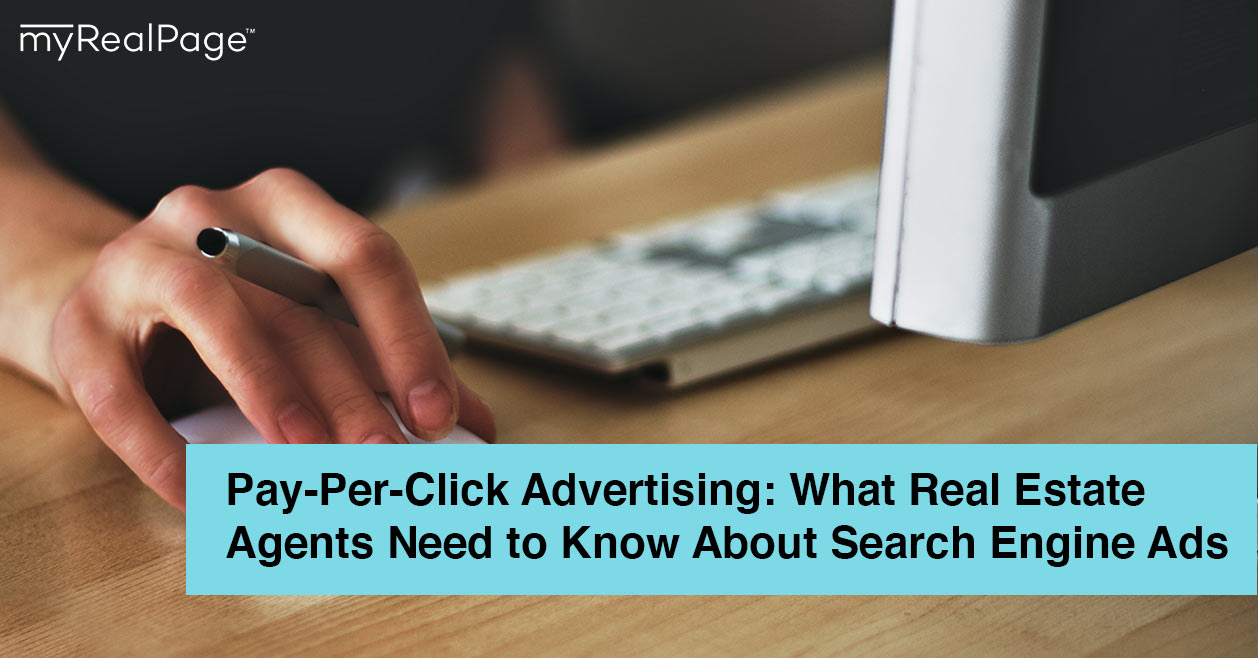Pay-Per-Click Advertising: What Real Estate Agents Need to Know About Search Engine Ads

It’s easier for real estate agents today to market and grow their real estate business than ever before.
Why?
Because they have access to so many powerful tools at affordable price points.
Facebook Ads is one leading example. And today we’re going to talk about another: real estate search engine ads, or pay-per-click (PPC) advertising.
It’s not as intimidating as it sounds. With some reading and a bit of practice, real estate PPC advertising is something every agent can take advantage of — even if you’re new to the world of digital advertising.
In this post, we’re breaking down PPC advertising, what it offers real estate agents and how real estate agents can take advantage (all in easy-to-understand language!).
Keep reading!
What Is Pay-Per-Click (PPC) Advertising?
Let’s say you took out an ad in the local newspaper for your real estate business. And let’s say that ad cost you $750.
Maybe you got a few phone calls or emails after your ad appeared. Maybe you didn’t get any at all. Either way, the ad still cost you $750.
What if you only had to pay when your ad resulted in a phone call or an email?
That’s pay-per-click advertising. Also commonly known as search engine marketing (SEM), it’s a popular type of digital advertising that lets advertisers pay for their ad space based on how many clicks the ad generates.
Where do PPC ads appear?
There are a few different types of PPC ads. In this post, we’re focusing specifically on the most popular: search engine ads. These are ads that appear in search engine results on Google, Yahoo and Bing. They look similar to other results but are placed in strategic areas of the search engine results page (sometimes called SERP). They appear when someone searches for a specific phrase that the ad is targeting.
Other types of PPC ads include display ads (usually small banner ads that appear on websites, they’re usually for products or services that a user searched for at some point), product ads (like search engine ads but for shoppable product listings) and Facebook ads.
What do PPC ads look like?
PPC ads that appear in search engine results are typically text-only, with a prominent headline.
Where do PPC ads lead to once clicked?
PPC ads almost always lead to a destination where an action takes place. It could be a shoppable page, where the user hopefully makes a purchase. Or it could be a lead generation page, where the user submits their contact information, requests a quote, books an appointment or signs up for an event.
Why do some PPC ads get more prominent placement than others?
Great question. PPC search engine ads rely on what’s called auction bidding.
When submitting their ad, the advertiser tells the search engine which keywords it wants to target and how much they’re willing to pay (maximum) per click for the ad. This is the bid.
When a search engine user enters a search for one of those keywords, the search engine will look to see which advertisers are bidding on that keyword.
Then, the search engine will consider a variety of factors — including how relevant the ad is to the user’s search, how likely the ad is to be clicked, and how relevant and useful the ad’s destination page is to the user — in order to assign each possible ad a “quality score.” This process is the auction.
The quality score and maximum bid are used to decide which ads are shown and where.
How much do PPC ads cost?
The cost depends on two key variables:
- How many clicks the ad receives
- The keywords the ad is targeting (and how much competition there is for those keywords)
The average cost per click of PPC ads varies across industries. In the real estate world, the average cost per click is thought to be somewhere between $0.50 and $5, depending on the area and competition.
Why Should Real Estate Agents Use Search Engine PPC Ads?
Real estate agents should use search engine ads to increase relevant traffic to their website.
You might be thinking: “But I already do that via organic and paid social media.”
Here’s why search engine ads for real estate agents are different.
Search engine ads meet users where they’re at. By that we mean, they serve users with the content they’re looking for, at the moment they’re looking for it.
Let’s say you’re a Calgary real estate agent who specializes in condos. Now let’s say a prospective Calgary condo buyer is starting their home search online. They head to Google and search “Calgary condos.”
If you’ve bid on that keyword (or a closely associated phrase) and Google decides (in the auction process) that your ad is worthy, then boom — that prospective Calgary condo buyer will see your ad featured prominently in their search results.
That’s a huge win, for two reasons:
- The person searching is a valuable lead. A person who sees your real estate PPC ads is actively looking for your services — they didn’t just stumble on your ad while scrolling their Instagram feed.
- It’s instant. Organic marketing efforts, like search engine optimization and building an engaged social media following, take time. Search engine ads for real estate agents can pay off instantly.
How Can Real Estate Agents Use PPC Ads?
The goal of your real estate search engine ad is to drive high-quality leads to your website and to keep them there long enough so that they’ll complete an action
Your website homepage likely doesn’t offer enough value or allure for a lead to stay and explore. You want to link your search engine ads to a specific landing page on your website, one that has some sort of form or opportunity to capture their contact information.
For that reason, we suggest either of the following website pages as the final destination for your search engine ads:
- An IDX solutions page, where leads can complete searches for properties. They’ll be prompted to contact you for more information about listings they’re interested in.
- A page featuring sold listing data, where leads have to provide their name and email address in order to access the data
Once you know where you want your real estate ad to drive to, you can decide how you’re going to convince users to click the ad.
This involves bidding on the right keywords and writing an appealing headline and description.
There is a little bit more to the process besides picking keywords and writing copy. If you’re ready to start experimenting with search engine ads for your real estate business, we suggest reading through this guide to Google Ads, the most popular platform for search engine ads.
Have you run search engine ads for your real estate business?
Last Updated on March 7, 2025 by myRealPage


